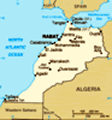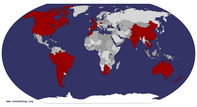Advertisement
Published: March 23rd 2011
Dune - the sequel. If you don't get that, you suck.
The camel trek was expensive, and not all that long. Frankly, it was a bit of a gamble, as I booked it from home based on online reviews. Turns out I could have done a cheaper trek, though it would not have been the same. The trip was amazing. These guys have really worked out their routine, with things times perfectly so you can see the best sights at the best times. The food is amazing, and the natural setting of the desert makes you feel helpless against the current of calm.
The first day was quite long, as Omar (trek company owner) and I departed Marrakech at 6am, arriving in Merzouga at 3.30pm. On the way, I did quite a bit of napping; in my waking hours, I was lucky enough to observe some small, fairly untouched towns, and the spectacular High Atlas mountains, which we passed right over. The variability of the landscapes made for interesting viewing, not to mention the differences between towns. Some were small and dirty, obviously poor, while some were quite prosperous. Chief among these was Ourzazate, Morocco's movie capital, which had
perfectly tarmacced roads and shiny, new walls, as well as a fake Kasbah used in the filming of Kingdom of Heaven. Arriving in to Merzouga was striking, as it is unlike any of the other towns. Located right on the edge of the Erg Chebbi dunes, it runs in a long straight line, hotel after hotel, occasionally interrupted by a group of tents or a shop and petrol station. We paused here a very short time, then set out into the desert on my camel! I named him "You Bastard", in honour of the camel in Terry Pratchett's "Holy Wood" Discworld novel. You Bastard was the world's greatest mathematician, able to calculate the exact vector and force to apply to a wad of spit in order to hit the desired target at distance. My camel didn't spit, so maybe it was better at other subjects?
Anyway, my guide in the desert itself was Iusef, not Omar as I had thought. This turned out well, as Iusef was younger and more chatty than Omar. We had a short trek to the camp for the first night, then settled in as Iusef began to cook our tagine. I went to the
top of a large dune nearby to await the sunset; it was a little bit overcast though, oddly for the desert, so the sunset was not so spectacular as normal. There was a Bedouin family in the camp, and we would be spending time with them on the final night. I could hear some voices in the distance, and later in the evening we joined some people in the next camp over. There were two English guys in that camp, Dan and Luke, and we chatted and played drums by the fireside in the fading light. Later in the evening, some of the coulds parted and we got a good view of the stars. In the desert, there is no light pollution, so you can see a lot more stars than at home or in any city. We went back to camp in the dark, and I think I might have missed it but for Iusef. The night was incredibly serene; total, uncompromising darkness, and not so much as the sound of a breeze. I slept well.
Next morning, we struck out after breakfast (omelette), at around 9am. I went walking instead of on the camel back. Having the
sand between my toes was pleasant, though that evening I noticed a few little cuts- the tiny stones in the sand are quite abrasive. I walked for a couple of hours, through the midday sun (no clouds around now), and only boarded the camel as we approached the black desert. The black desert looks black from a distance due to the larger stones strewn along it's surface. It is flat, no dunes, and as such has little or no breeze, making it baking hot. It is a stunning scene, with little to see aside from a few other huts and the communal goats roaming the area. A road passes near the place we stopped to stay with a Berber family, and it is on the Paris-Dakar rally route. The family we stayed with didn't really speak any English; the daughter had some, but the girls stay out of sight when there is a guest. We had a delicious lunch, some sort of onion, pepper and garlic chili with fried eggs on top, and then had a snooze to escape the heat. I woke before Iusef in the evening, and tried to communicate with my host, Eli. It wasn't easy, but
I managed to convey where I was from and that I liked animals, including his beautiful white dog. The dog kept chasing the motocross bikes that would occasionally pass by. It was definitely less quiet around here due to these bikes, but in between their visits it was serene. After sundown, we retired to the tent and had another awesome tagine. It gets dark early, so to fill some time, we watched 127 hours on my phone. That dude really suffered to get out of the canyon, but on the plus side it made for a decent movie. Again the evening was a little cloudy, so sunset was a little muted.
On the second morning, we headed back to our original camp for the day. Our lunch was there on arrival, a salad of fish and onion and tomatoes. My legs were stiff from the dune walking, so I rode the camel all the way back. When you don't need to look where you're going, you get to look at the background more as well. Now that I looked, I found I could recognise some landmarks from before. Not saying I would have liked to go walking alone, but
I can see how you could navigate after a while there. I also could see some other camel treks going in various directions; it was a busy little stretch of desert, which adds another layer of safety. I may go back some day and wander it by myself. It is 15km west to east, and 60km north to south, so head west and you'll eventually hit a road. Anyway, Dan was hanging around when I got there, though Luke had headed back to town. Dan, Iusef and I hung around chatting in the tent, as a sandstorm had kicked up. It wasn't bad, but the few seconds I took to take a picture of sand whipping over the dune tops were sufficient to fill my camera and my eyes with sand. Then, the unbelievable happened: it rained. Apparently, that was the first rain in this part of the desert in several years, not counting small showers. This was proper, lasting, almost Irish rain. It stopped for a while and we had some more time outside, but afterwards we had to move to another, more waterproof tent when it came back. Dinner was a delicious cous cous. We sat and talked
some more, then turned in for the night.
My third and final morning was the saviour of the trip. The rain had cleared the cloud, so when we set out at 5am, it was a perfectly clear sky. The stars were absolutely amazing. I could see nebulae, never mind stars. Blue streaks across the eastern sky, punctuated by clear, blazing stars. There were shooting stars too; all you had to do was look at a patch of sky for a minute or two and you would see one. The desert really had saved its best for last. The little groups of stars that I knew from back home were now surrounded by whole groups of others. As we reached Merzouga, we paused on the last set of dunes to watch the sunrise. It was beautiful. Along the way, a gradual fading of darkness into blue light had revealed slowly more and more detail on the dunes. When we paused, I could see them quite clearly, though the sun was still to become visible on the horizon. As it did, the contrast of shadows and lit sand was remarkable. I was immensely sad to be leaving the desert, but also
glad to have enjoyed its serenity and enveloping peace.
After a huge breakfast at a hotel in Merzouga, I parted from my guide and met another Iusef, who would drive me back to Marrakech. He was very informative and chatty, so the trip flew in. He told me what had happened in Japan; being in the desert, you just don't hear anything. I got the full details upon returning to town, and I was horrified. I can see how the care free lives of the families in the desert are enviable; your biggest problem is getting your wife to chase away goats that don't belong to you, and the rest of the world just doesn't intrude. On the plus side though, it had been snowing in the High Atlas, so I was going to see something unique: 4 seasons in one day. It is rare for it to rain in the desert; snow in the High Atlas is also quite unusual, on the lower sections that is. As such, it seemed that not only the desert, but Morocco itself was saving its best for this journey. We left the desert in scorching heat, rather like Summer. We came to
Ourzazate, where it was breezy and rainy, like Autumn. The High Atlas were an analogue of winter, with snow covered valleys and peaks in sharp contrast with the red soil. Marrakech was like spring, warmer but with light rain. Of course, the other thing I noticed upon returning to Marrakech was the noise. Having been in the utter seclusion and peace of the desert, Marrakech now seemed more gaudy and abrasive than charming. It was at this point that I really began to tire of the call to prayer. I suppose I needed to get reacquainted with the normal world, but Marrakech was not the gentle gradient required.
My return to Marrakech was late-ish, so I headed to a hotel where Tony had stayed, and went to pick up some replacement supplies. I also took the time to go to the hammam, where all the sand was thoroughly washed from me by a short, fat Moroccan man for 40DH. The hammam is an interesting experience, but I can see the attraction: it is time away from the missus, and COMPLETELY manly. Even when he lifted my shorts and washed my bum cheeks quickly, it was certainly in a very
masculine manner. In the morning, I headed to Casablanca by train and found a hotel close to the train station; at 4.40am I would board the train to the airport, and get on my flight to Cape Town. I was excited to cross the Equator and to see the modern South Africa I had heard so much about. I was also excited to experience an Etihad flight. Leaving Morocco was not so difficult, as it had been hectic as much as it had been beautiful. I would certainly return here, though I think it may be losing it's identity. Charming souks and sellers are being replaced by aggressive hawkers and greedy traders; the old towns are shrinking in favour of new, European style city centres. Perhaps when the old neighbourhoods are abandoned, they will regain their status with the locals. Difficult to say, but if so, it would be good to come back at that time.
Advertisement
Tot: 0.077s; Tpl: 0.012s; cc: 13; qc: 27; dbt: 0.0361s; 1; m:domysql w:travelblog (10.17.0.13); sld: 1;
; mem: 1.1mb




















